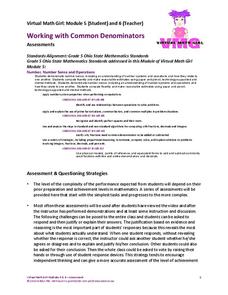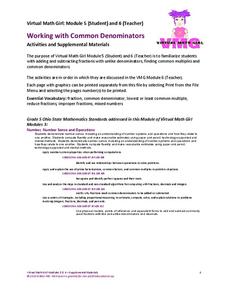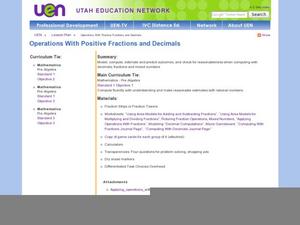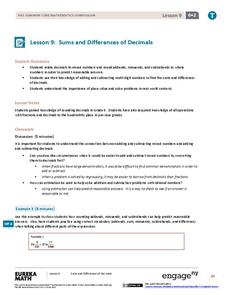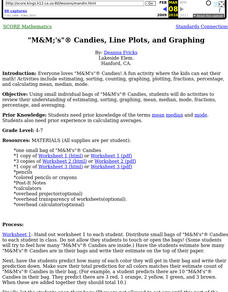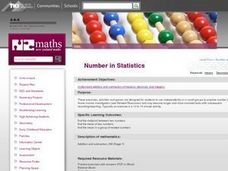PBS
Working with Common Denominators: Assessments
Now that the practice is over, see if young mathematicians can utilize their new skills on finding common denominators and adding fractions. The assessment contains one map challenge and follows with skills practice.
PBS
Working with Common Denominators: Activities and Supplemental Materials
Enjoy these straightforward and simple worksheet pages that practice with different denominators. The practice starts simple with adding fractions together and then works on a recipe that needs to be tripled.
Curated OER
Operations with Positive Fractions and Decimals
Explore the concept of fractions and decimals! In this fractions and decimals lesson, pupils use fraction tiles to express fractions. They play a fraction review basketball game where when a team gets a question correct they get to shoot...
EngageNY
Sums and Differences of Decimals
Sometimes dealing with decimals is so much easier than dealing with fractions. The ninth lesson in a 21-part module has the class consider situations when it might be easier to add or subtract fractions by first converting to...
Curated OER
Rational, Irrational and Square Roots
Students identify rational and irrational numbers and their use in mathematical functions. Through demonstration, students discover the difference between rational and irrational numbers and their use. Using estimation skills students...
Curated OER
Skip it to multiply it
First graders make sensible estimates and check the reasonableness of answers.
They make up, tell and record number stories up to 9 about given objects. They skip count in twos, threes and fives.
Curated OER
The Part-adder 1
Second graders investigate the addition of whole numbers. They mentally perform calculations involving addition and subtraction. They make sensible estimates and check the reasonableness of answers.
Curated OER
M&Ms; Line Plots and Graphing
Students, using small individual bags of M&Ms, engage in activities including; estimating, sorting, graphing, mean, median, mode, fractions, percentage, and averaging.
Curated OER
The Number Partner
First graders study number pairs and identify number pairs that sum to numbers from 10 to 30. They use number pairs to solve addition and subtraction problems. They make sensible estimates and check the reasonableness of answers.
Curated OER
Number in Statistics
Second graders add two and three digit numbers. They are taught how to calculate the mean and the midpoint. Students are shown how to calculate symmetrical set of numbers. They are shown a model adding the same to each increases the...
Curated OER
Sieve of Eratosthenes
Learners investigate numbers, ways of representing numbers, relationships among numbers and number systems. They comprehend the meaning of operations and how they relate to each other.
Calculator Soup
Calculator Soup: Estimating Sums and Differences of Fractions Calculator
Estimate sums and differences for positive proper fractions, n/d (numerator/denominator). Use rounding to estimate answers when adding or subtracting proper fractions.


